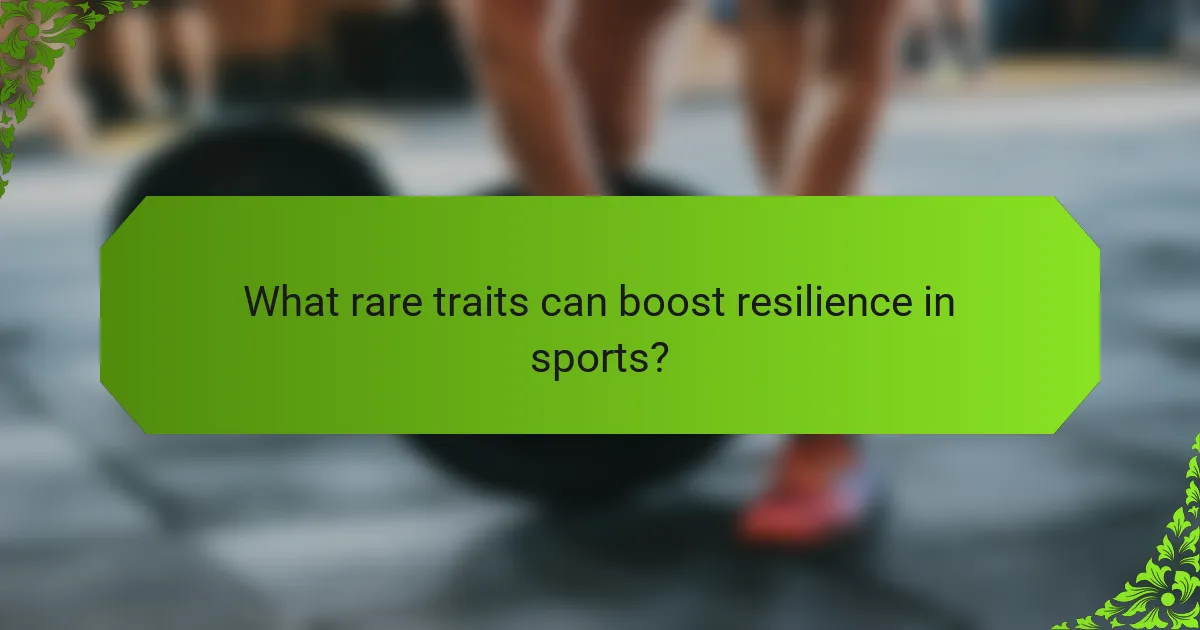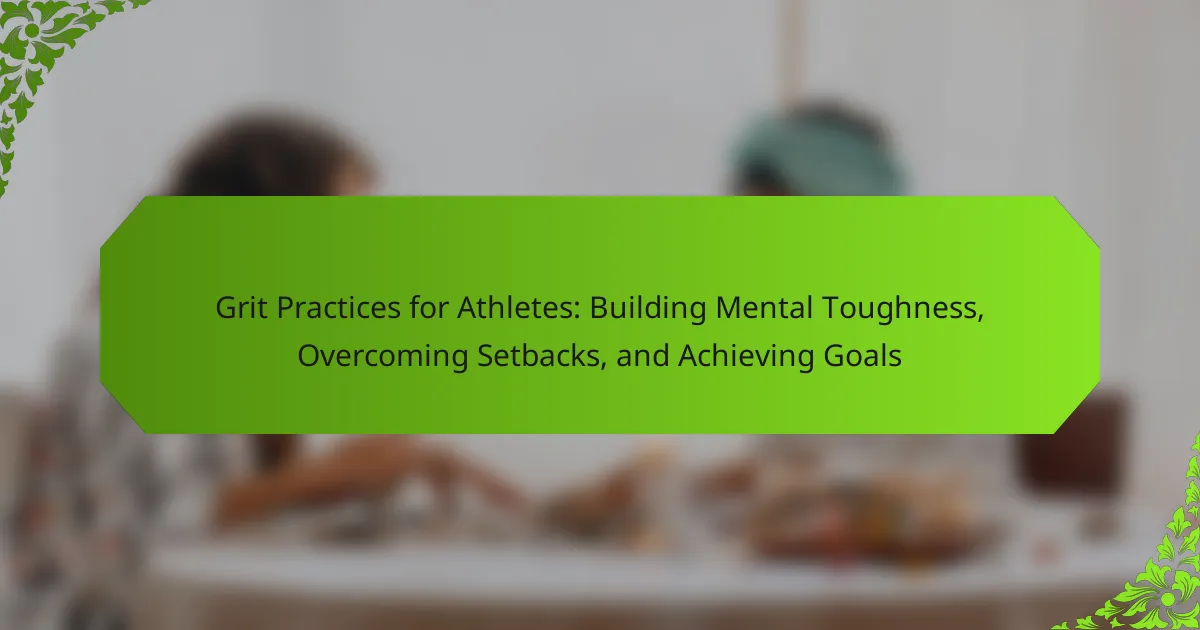Building resilience is crucial for amateur athletes aiming for success in sports. This article explores essential grit practices such as goal setting, maintaining a positive mindset, embracing challenges, and reflecting on experiences. These strategies enhance performance, foster personal growth, and develop mental toughness, adaptability, and perseverance. By cultivating these attributes, athletes can better navigate setbacks and stay focused on their long-term goals.

What is Resilience in Sports?
Resilience in sports refers to an athlete’s ability to recover from setbacks, adapt to challenges, and maintain focus under pressure. Building resilience involves essential grit practices such as setting realistic goals, embracing failure as a learning opportunity, and fostering a positive mindset. These practices enhance an athlete’s performance and overall well-being. Research indicates that resilient athletes often experience improved motivation and perseverance, leading to greater success in their sports endeavors.
How does resilience impact athletic performance?
Resilience significantly enhances athletic performance by fostering mental toughness and adaptability. Athletes with high resilience can better manage stress, recover from setbacks, and maintain focus during competitions. Studies show that resilient athletes often exhibit improved endurance and consistency, leading to better overall results. For instance, a resilient mindset allows athletes to push through physical and mental barriers, ultimately enhancing their competitive edge.
What role does mental toughness play in resilience?
Mental toughness significantly enhances resilience in athletes by fostering perseverance and adaptability. It enables athletes to push through adversity, maintain focus under pressure, and recover from setbacks. This grit is essential for amateur athletes striving for success in competitive sports. Studies show that mentally tough athletes often outperform their peers, demonstrating that resilience is not merely about physical ability but also about psychological strength. Developing mental toughness involves training techniques such as visualization, positive self-talk, and goal setting, which collectively build a robust mindset.

What are the essential grit practices for amateur athletes?
To build resilience, amateur athletes should practice goal setting, maintain a positive mindset, embrace challenges, and reflect on experiences. These grit practices enhance performance and foster personal growth.
Goal setting involves creating specific, measurable, achievable, relevant, and time-bound objectives. This clarity helps athletes focus their efforts and track progress.
Maintaining a positive mindset allows athletes to overcome setbacks and stay motivated. Techniques such as visualization and affirmations can reinforce this mindset.
Embracing challenges encourages athletes to step out of their comfort zones. This approach leads to skill development and increased confidence.
Reflecting on experiences helps athletes learn from successes and failures. Regular self-assessment promotes continuous improvement and adaptability in training.
How can goal-setting enhance grit?
Goal-setting significantly enhances grit by providing clear objectives and a sense of purpose. This focus allows amateur athletes to remain committed during challenges. Setting specific, measurable, achievable, relevant, and time-bound (SMART) goals fosters resilience and motivation. As a result, athletes develop perseverance, a unique attribute linked to sustained effort in achieving long-term success.
What are effective goal-setting techniques?
Effective goal-setting techniques for amateur athletes include SMART goals, visualization, and accountability partnerships. SMART goals ensure objectives are Specific, Measurable, Achievable, Relevant, and Time-bound, enhancing focus and clarity. Visualization helps athletes mentally rehearse success, boosting confidence and performance. Accountability partnerships provide support and motivation, encouraging athletes to stay committed to their goals. Implementing these techniques fosters resilience and grit, essential for achieving success in sports.
What is the significance of perseverance in sports?
Perseverance is crucial in sports as it fosters resilience, enabling athletes to overcome challenges and setbacks. This grit enhances performance, builds mental toughness, and encourages continuous improvement. Athletes who persist in the face of adversity are more likely to achieve long-term success and reach their goals. Studies show that perseverance correlates with higher achievement levels, highlighting its significance in competitive environments.
How does self-discipline contribute to grit?
Self-discipline significantly enhances grit by fostering consistent effort and perseverance in amateur athletes. This attribute enables athletes to push through challenges and maintain focus on long-term goals. Studies show that self-discipline correlates with improved performance metrics, supporting resilience. As a result, athletes who cultivate self-discipline often exhibit higher levels of determination and success in their sports endeavors.

What are the universal attributes of resilience in amateur athletes?
Resilience in amateur athletes includes mental toughness, adaptability, and perseverance. These universal attributes enable athletes to overcome challenges and maintain focus on their goals. Mental toughness allows for sustained effort despite setbacks. Adaptability helps athletes adjust strategies based on performance feedback. Perseverance drives consistent practice and improvement over time. Together, these attributes form a foundation for success in sports.
How does adaptability influence athletic resilience?
Adaptability significantly enhances athletic resilience by enabling athletes to respond effectively to challenges. Athletes who embrace change can adjust their training, strategies, and mental approaches, fostering growth. This flexibility allows them to recover from setbacks more swiftly, maintaining performance under pressure. Research indicates that adaptable athletes demonstrate higher levels of perseverance and a greater capacity for overcoming obstacles, crucial for long-term success in sports.
What common challenges do amateur athletes face?
Amateur athletes often face challenges such as lack of resources, time constraints, and mental fatigue. These obstacles can hinder their performance and growth in sports.
One significant challenge is limited access to coaching and training facilities, which affects skill development. Additionally, balancing training with work or school commitments often leads to inconsistent practice schedules.
Mental resilience is another critical area where amateur athletes struggle. They may experience self-doubt and pressure, impacting their focus and motivation. Developing grit through specific practices can help overcome these mental barriers.
Lastly, injury management is a common challenge. Without proper support systems, amateur athletes may not receive adequate rehabilitation or preventive care, prolonging recovery and affecting their performance.

What unique attributes differentiate resilient athletes?
Resilient athletes exhibit unique attributes that set them apart, including mental toughness, adaptability, and a strong sense of purpose. Mental toughness enables them to persevere through challenges, while adaptability allows them to adjust strategies in response to setbacks. A strong sense of purpose drives their commitment and motivation, fostering a relentless pursuit of goals. These attributes collectively enhance their performance and contribute to long-term success in sports.
How does emotional regulation enhance performance?
Emotional regulation significantly enhances performance by promoting focus and resilience during competitions. Athletes who manage their emotions effectively can maintain composure under pressure, leading to improved decision-making and execution. Research indicates that emotional regulation skills correlate with higher levels of grit, a unique attribute essential for long-term success in sports. This ability to navigate emotional challenges allows amateur athletes to push through setbacks, fostering a growth mindset and ultimately enhancing their overall performance.
What specific training methods build grit?
Deliberate practice, goal setting, and mental conditioning are specific training methods that build grit. Deliberate practice involves focused, repetitive training to improve skills. Goal setting creates clear objectives, enhancing motivation and perseverance. Mental conditioning techniques, such as visualization and positive self-talk, foster resilience in challenging situations. These methods collectively enhance an athlete’s ability to face adversity and maintain effort over time.

What rare traits can boost resilience in sports?
Rare traits that can enhance resilience in sports include mental flexibility, emotional regulation, and a strong sense of purpose. Mental flexibility allows athletes to adapt strategies during competition, fostering a growth mindset. Emotional regulation helps manage stress and anxiety, enabling consistent performance. A strong sense of purpose drives motivation and commitment, especially during challenging times. These traits collectively contribute to an athlete’s ability to bounce back from setbacks and maintain focus on long-term goals.
How can a growth mindset influence athletic success?
A growth mindset significantly enhances athletic success by fostering resilience and adaptability. Athletes with this mindset view challenges as opportunities for growth, leading to improved performance.
Research shows that athletes who embrace a growth mindset are more likely to persist through setbacks. They tend to engage in deliberate practice, which is crucial for skill development. This approach encourages continuous learning, allowing athletes to refine techniques and strategies.
Moreover, athletes with a growth mindset often exhibit higher levels of motivation and self-efficacy. This unique attribute enables them to set ambitious goals and maintain focus, even under pressure. As a result, they achieve greater success in competitions.
In summary, a growth mindset cultivates essential grit practices that contribute to resilience, motivation, and ultimately, athletic success.
What role does community support play in resilience?
Community support significantly enhances resilience by providing emotional and practical resources. It fosters a sense of belonging and encourages perseverance among amateur athletes. Strong social connections offer motivation and accountability, which are critical during challenges. Moreover, shared experiences within a community can help athletes develop grit, a unique attribute essential for overcoming obstacles in sports. Ultimately, community support acts as a buffer against stress, promoting mental toughness and sustained commitment to athletic goals.

How can amateur athletes cultivate resilience in their training?
Amateur athletes can cultivate resilience in their training by adopting specific grit practices. These practices include setting clear, achievable goals, maintaining a positive mindset, and embracing challenges as opportunities for growth.
Consistent goal-setting helps athletes focus their efforts and measure progress. A positive mindset fosters motivation, allowing athletes to push through setbacks. Embracing challenges builds mental toughness, essential for long-term success.
Incorporating recovery strategies, such as rest and reflection, also enhances resilience. Athletes should evaluate their training experiences to identify lessons learned. Developing a support network of coaches and peers further strengthens their resolve.
Ultimately, resilience in sports is cultivated through deliberate practice, self-reflection, and a commitment to personal growth.
What daily practices can enhance mental toughness?
To enhance mental toughness, amateur athletes should adopt daily practices focused on discipline, self-reflection, and goal-setting. Consistent training routines build resilience by fostering a strong work ethic. Practicing mindfulness helps athletes manage stress and maintain focus during competition. Regularly setting and reviewing short-term and long-term goals cultivates a growth mindset, essential for overcoming challenges. Engaging in positive self-talk reinforces confidence and mental fortitude.
How can athletes learn from failure?
Athletes can learn from failure by analyzing mistakes, adjusting strategies, and fostering a growth mindset. Embracing setbacks builds resilience and enhances performance. Failure offers valuable insights that can lead to improved techniques and mental toughness. For example, athletes who reflect on their failures often develop better coping mechanisms and grit, essential for long-term success in sports.

What are the best practices for building grit in sports?
To build grit in sports, athletes should focus on consistent practice, goal setting, and mental toughness training. Developing a growth mindset enhances resilience. Embracing challenges and learning from failures fosters perseverance. Regular reflection on progress strengthens commitment and motivation.
What common mistakes should athletes avoid in their journey to resilience?
Athletes should avoid overtraining, neglecting mental health, ignoring recovery, and setting unrealistic goals. These mistakes can hinder resilience development and overall performance. Overtraining leads to burnout, while neglecting mental health can affect motivation. Recovery is essential for physical and mental regeneration, and unrealistic goals can create unnecessary pressure.
How can athletes optimize their grit development strategies?
Athletes can optimize their grit development strategies by focusing on consistent practice, setting clear goals, and cultivating a growth mindset. Regularly engaging in challenging training sessions enhances resilience. Setting specific, measurable, achievable, relevant, and time-bound (SMART) goals fosters motivation. A growth mindset encourages athletes to view setbacks as learning opportunities, which strengthens perseverance. Emphasizing these practices can significantly improve an athlete’s grit and overall performance in sports.
What expert insights can guide amateur athletes in resilience training?
Building resilience in sports requires focused strategies. Amateur athletes can enhance their mental toughness through consistent practice and mindset shifts.
1. Set specific, achievable goals to create a sense of purpose.
2. Embrace failure as a learning opportunity; analyze setbacks for growth.
3. Develop a support network for motivation and accountability.
4. Incorporate mindfulness techniques to manage stress and improve focus.
5. Maintain a balanced training schedule to prevent burnout and promote recovery.
These practices build grit, essential for long-term success in sports.



